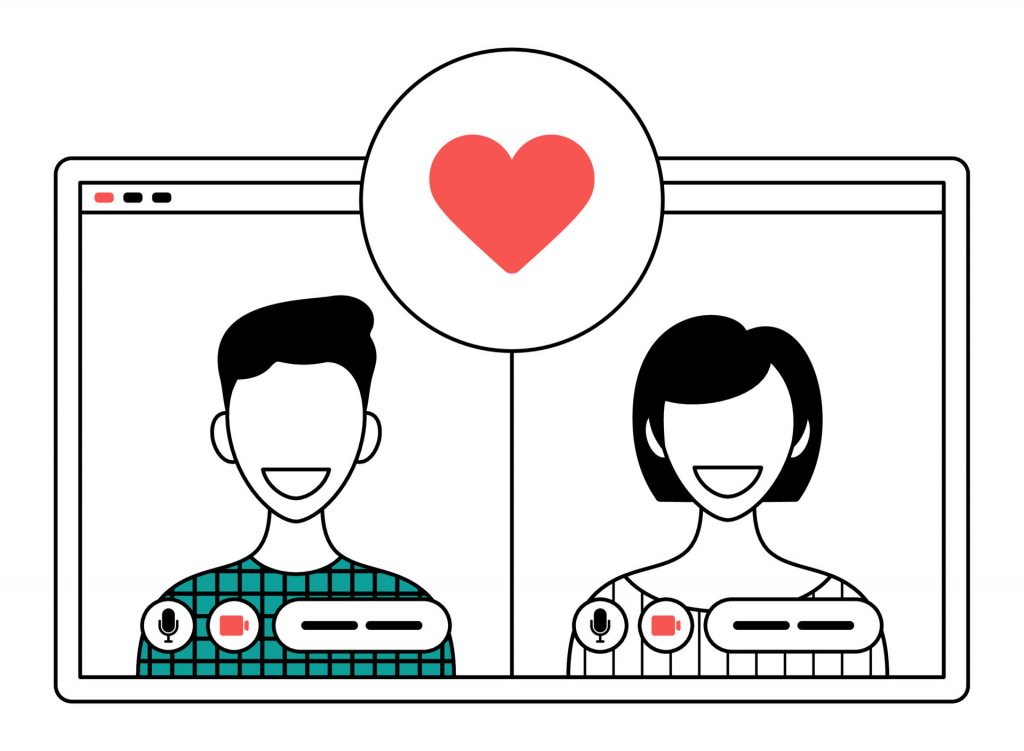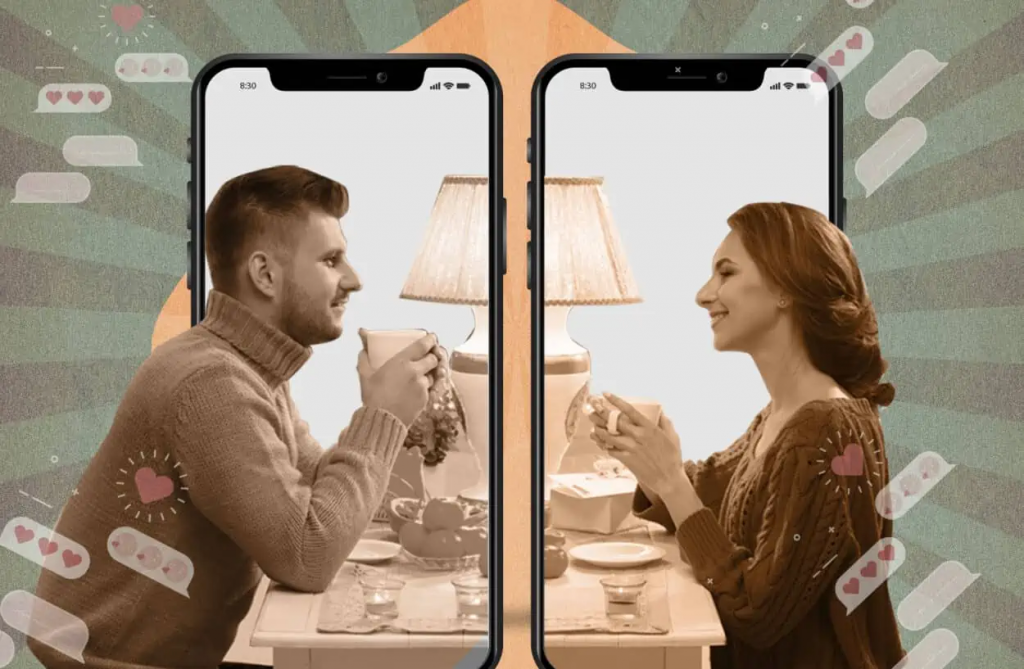In the not-so-distant past, meeting a potential partner typically involved chance encounters at social gatherings, through mutual friends, or perhaps a serendipitous meeting at a coffee shop. Fast forward to today, and the landscape of dating has dramatically transformed, primarily due to the advent of online dating platforms and the pervasive influence of social media.
Love in the digital age is now characterized by algorithms, swipes, likes, and messages that travel across cyberspace. This revolution in how we find love has opened up new possibilities while also presenting unique challenges.
The Evolution of Online Dating
Online dating has come a long way since its inception. The earliest forms of online dating can be traced back to the 1960s with computer dating services like Operation Match, which matched users based on data from questionnaires. However, it wasn’t until the late 1990s and early 2000s that online dating began to gain significant traction. Websites like Match.com and eHarmony pioneered the industry, offering a new and exciting way to meet potential partners. These platforms utilized detailed questionnaires and complex algorithms to match users based on compatibility, bringing a scientific approach to the art of matchmaking.
Today, the landscape of online dating is incredibly diverse, catering to a wide range of preferences and interests. From mainstream platforms like Tinder and Bumble, which emphasize simplicity and immediacy, to niche sites like FarmersOnly and Christian Mingle, which cater to specific communities, there is an option for almost everyone. According to a report by the Pew Research Center, nearly 30% of U.S. adults have used an online dating app or site, highlighting the widespread acceptance and popularity of these platforms.

The Mechanics of Online Dating: Algorithms and Affinity
The heart of online dating lies in its algorithms. These complex systems analyse vast amounts of data to suggest potential matches based on user preferences, behavior, and sometimes even subconscious choices. For instance, Tinder’s algorithm considers factors like the number of swipes, time spent on profiles, and even your past interactions to curate a list of potential matches.
Bumble, another popular dating app, introduces a unique twist by allowing only women to initiate conversations, aiming to create a more empowering and less pressured environment for female users. Other apps like Hinge claim to focus on fostering meaningful connections by encouraging users to engage in conversations based on shared interests and prompts.
Despite the sophistication of these algorithms, the ultimate success of online dating often hinges on the willingness of individuals to engage authentically. While technology can facilitate initial connections, it is up to the users to build and nurture these relationships.
Social Media: The New Stage for Romance
Social media has also significantly impacted the way we approach dating and relationships. Platforms like Facebook, Instagram, and Twitter provide a window into the lives of others, allowing us to connect with people beyond our immediate social circles. This has made it easier to rekindle old friendships, forge new connections, and even find love.
One of the ways social media influences dating is through the phenomenon of “stalking.” Before going on a date, it has become common practice to look up a potential partner’s social media profiles. This allows individuals to gather information and form initial impressions, sometimes even before meeting in person. While this can be a useful tool for ensuring safety and compatibility, it also raises questions about privacy and authenticity.

Moreover, social media platforms have become a space for public displays of affection and relationship milestones. Sharing pictures, posting status updates, and tagging partners in posts are now part of the modern courtship ritual. These actions can strengthen relationships by signaling commitment and creating shared memories. However, they can also lead to pressures and comparisons, as individuals may feel compelled to present an idealized version of their relationship to the online world.
The Challenges of Digital Love
While online dating and social media offer new avenues for finding love, they also present unique challenges.
- Paradox of choice: With countless potential partners just a swipe away, individuals may find it difficult to commit, always wondering if a better option is just around the corner. This can lead to a phenomenon known as “swiping fatigue,” where users become overwhelmed by the sheer volume of choices and disengage from the process altogether.
- Authenticity: Online profiles often present a curated version of an individual, highlighting positive traits while concealing flaws. This can lead to a disconnect between online personas and real-life personalities, causing disappointment and mistrust when expectations do not align with reality.
- Catfishing: Despite efforts by dating platforms to verify profiles and ensure authenticity, catfishing remains a prevalent issue. This can lead to emotional harm and undermine trust in online dating.
- Superficial connections: The focus on appearance and instant gratification may overshadow the deeper aspects of compatibility and emotional connection. This can make it challenging to build meaningful, long-lasting relationships.
Tips for Successful Online Dating
Despite these challenges, many people have successfully found love in the digital age. Here are some tips to navigate the world of online dating and social media effectively:
- Be Authentic: Present yourself honestly in your online profiles and interactions. Authenticity fosters genuine connections and helps build trust from the outset.
- Set Realistic Expectations: Understand that online personas may not fully reflect an individual’s true self. Approach new relationships with an open mind and realistic expectations.
- Prioritize Safety: Be cautious about sharing personal information and meeting new people. Use platform features to verify profiles and consider meeting in public places for initial dates.
- Engage Actively: Invest time and effort into getting to know potential partners. Meaningful connections often require more than just swipes and messages.
- Balance Online and Offline Interactions: While online platforms are useful for initial connections, make an effort to transition to offline interactions to build a deeper relationship.
- Take Breaks: If you feel overwhelmed or fatigued, take a break from online dating. This can help prevent burnout and maintain a positive outlook.

Lifebonder: Creating meaningful life-bonding friendship
Navigating love in the digital age can be challenging, but platforms like Lifebonder provide a refreshing alternative. Lifebonder focuses on fostering genuine, pressure-free connections by matching users based on shared hobbies and interests. Unlike traditional dating apps, Lifebonder aims to eliminate toxicity and create a safe space for forming friendships and connecting with like-minded individuals.
If you’re tired of the pressures and superficiality of online dating, Lifebonder offers a platform where you can meet new friends and build meaningful relationships without the stress and toxicity often found in the digital world. Embrace the possibilities of digital life with authenticity and intention, and you may find that the right connections are just a few clicks away.


